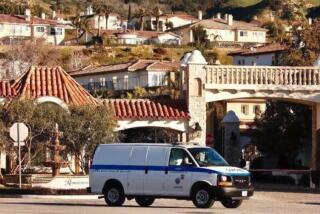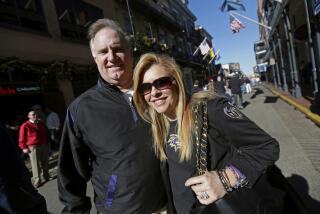The Strange Final Weeks of Len Bias’ Life : As His Date With Fortune--and Death--Drew Near, He Was Different
- Share via
WASHINGTON — In the investigation of Maryland basketball star Len Bias’ death, people in dark glasses go in and out of a small-town courthouse, friends become suspects, mystery women appear and disappear, a local nightclub becomes prominent. None of which provides the answer to what made a good guy come to such a bad end.
Perhaps not even Bias knew what caused him to ingest a lethal dose of cocaine in his dormitory on the Maryland campus June 19.
Was it the result of the persuasion of someone else?
Or did he do it himself, uttering, according to sources, a now-chilling phrase the moment before he collapsed and lost consciousness: “I’m a bad . . . and I can handle anything”?
Bias, at 22, may have just begun to solve his personal mysteries, and several different pictures of him have emerged in the weeks since his death. According to Bias’ oldest and closest friends, as well as family, he remained a relatively clean-living, born-again Christian.
Such sources speculate that Bias may have experimented with cocaine in a moment of euphoria resulting from his selection by the Boston Celtics in the first round of the National Basketball Assn. draft two days earlier.
The darkest scenario has him being set up by a drug dealer looking to develop a customer.
Others, however, say Bias changed in the last months of his life, the once-gracious star athlete becoming arrogant, careless and even unpleasant on occasion.
He spent large amounts of money on clothing and jewelry, spent as many as four nights a week at a Southeast Washington nightclub, and was warned that he was hanging out with the “wrong element.”
The consensus among friends is that if Bias did become involved with drugs on a regular basis, it would have happened in the last months of his life, as he spent increasingly less time on campus and more time dealing with the pressures of a potential NBA superstar.
The facts are these: Police say three people were with Bias when he collapsed at about 6:30 a.m. in Washington Hall--basketball players Terry Long and David Gregg, and close friend Brian Lee Tribble.
All have been indicted on drug charges, and Prince George’s County (Md.) State’s Atty. Arthur A. Marshall Jr. has said “evidence will show” Tribble provided the cocaine that killed Bias.
Medical examiners originally said it was Bias’ first experience with cocaine, then amended that statement, saying there is evidence that he used the drug before.
Those who knew Bias best are struck by the differing views of him that have emerged from the grand jury investigation at the Upper Marlboro, Md., courthouse.
Said someone who has known Bias as well as anyone the past eight years, “I don’t know what’s real and not real anymore. I thought I knew him.”
One thing that confuses friends is that if Bias was a regular drug user, it almost surely would have taken a toll on his physical condition.
But Maryland trainer Frank Grimaldi said the morning of his death, “Len could play a 40-minute game, then play an overtime, then give a 10-minute interview and never even breathe hard.”
Terrence Lewis, one of Bias’ closest childhood friends, said the two, shortly before Bias’ death, had played basketball together at Columbia Park Recreation Center in Landover, Md., the neighborhood gym where both learned the game.
“Sometimes I’d say afterward, ‘Let’s go get a drink,’ ” Lewis recalled. “ ‘He’d say, ‘No, I’m not drinking right now.’ He was very strict about what he put into himself; he was proud of his physique. He’d joke about it, say, ‘I’m not taking anything to hurt this body, this physical specimen.’ ”
Adrian Branch, Bias’ teammate and close friend at Maryland, said Bias was as protective of his reputation as he was of his body.
“Len’s nobody’s drug user,” he said. “You don’t build the reputation he had when you’re doing drugs. He knew everything he did was magnified, everyone was looking in the cracks and crevices. He was a very private person. If he was going to do something to harm himself or embarrass himself, he’d stop and think about it.”
But Barrette Palmer, a Maryland student and friend of some members of the team, said she smoked marijuana with Bias, Terry Long or David Gregg about 10 times. She said she used the drug about twice as many times with Long and Gregg.
According to Palmer, Tribble had offered her cocaine on one occasion during a phone conversation. They did not use the drug, and Tribble did not offer it again, she said.
But Palmer, who testified before the grand jury last month, said she never saw or heard of Bias using cocaine.
Tribble and Bias both enjoyed the nightlife at Chapter III, a popular Southeast Washington club. Lewis also went to Chapter III on a number of occasions this spring.
“Every time I went, Len was already there,” Lewis said. People who work at the club say Bias came in as many as four nights a week: Wednesday (ladies night), Thursday (free barbecue), Saturday and Sunday (come-as-you-are night).
He rarely left before closing and usually with a woman. He frequently sat in front of the club asking women for age IDs and introducing himself. Always at his charming best.
Partying at Chapter III most of the spring semester didn’t leave a lot of time for studying.
Although Bias was 21 credits short of graduating, that did not necessarily mean he didn’t intend to finish. As late as the end of May, he made arrangements with an academic counselor to get help on a paper due in summer school.
Walter Hill, who taught him in an Afro-American studies class as a sophomore, said, “I knew there were pressures on him as he blossomed. I think after a while Len realized he could get on with being a pro basketball player. He had his own agenda (academically).”
One thing seems clear: The better Bias became on a basketball court, the more that agenda changed. His first two seasons, the Terrapins were Branch’s team. Also, Patrick Ewing was playing across town at Georgetown. Ralph Sampson (Virginia) and Michael Jordan (North Carolina) were the stars of the Atlantic Coast Conference. Len Bias was not a star, not yet, at least.
He had picked up a reputation in high school, however, for having “an attitude.” He’d whine about foul calls he didn’t like and was accused of quick retaliation.
But Bias worked hard to eliminate that behavior from his game. By his sophomore year, referees, reporters and opponents found him very likable.
By the end of last season, however, Bias seemed to revert to his earlier behavior, as the pressures of senior year in college mirrored those of senior year in high school.
One oft-told story is of the time Bias went to his high school coach in tears because no one would talk to him about anything but where he was going to college.
The same happened this past season, but with irritability instead of the tears, and he was sometimes described as surly.
Palmer described Bias as “frustrated” by increasing obligations. Often it seemed, according to one source, as if “everyone wanted a piece of him.” He took a weekend off at the end of May and went to Virginia Beach, Va., to regain his composure, but as the draft approached, he became cranky again.
“He was frustrated, confused;, it was very stressful,” Palmer said.
“A lot of girls were calling him, they all wanted to be the one because he was going to be rich and a star. That bothered him a lot. He’d say, ‘I don’t trust any women anymore. All they’re interested in is money, money, money.’ ”
But Bias was not shy and he was known to revel in his new status as one of the best three players in college basketball.
Former football player Donald Brown, a one-time roommate and friend, acknowledged that Bias became aware of his reputation. Brown remembers Bias saying, “This time next year we’ll both be making some cash. I bet you $1,000 I’m the No. 1 pick.”
“There was no question he was the man,” Brown said. “ . . . It’s like, who runs the yard, who has the most girls? He was the man. He made all the preseason All-Americas. They made a life-sized poster of him. Around the guys, he’d be pretty outgoing, he’d ham it up, brag on himself. But he was still an everyday athlete.”
By the end of the season, the pattern of Bias’ life, postcollege in effect, since he had all but stopped going to class, had developed, and he acquired the style of one about to become rich and famous.
He did dozens of radio and television interviews and a number of charity appearances. He worked at two basketball camps and had meetings with a number of NBA team officials. He selected an agent. He hung out with Brian Tribble--a lot.
“They were very close,” Palmer said. “They’d go clubbing, picking up girls. Like a normal group of college people trying to have some fun.”
In April, Palmer played in a pickup basketball game on campus with Bias, Tribble and Johnnie Walker, a childhood friend who became a Washington police officer.
She remembers numerous phone conversations between Bias and Tribble. Six months ago, Tribble--who raises pit bulldogs as a hobby--presented Bias with a puppy as a gift. Bias named it Ebony and bought it a red leather collar with spikes.
When Tribble was preparing to pick out a silver Mercedes-Benz, Bias accompanied him on at least one occasion to look at the car.
On May 16, Tribble was stopped on Maryland’s Campus Drive in the Mercedes and was found to have a suspended license, so he was not allowed to drive off. The other passenger in the car, Bias, drove it away.
Some of Bias’ closer friends now say they wondered about the company he was keeping. But many, including Lewis, chose not to mention it to him.
“I believed in Len’s judgment,” Lewis said. “I knew he wasn’t that type. He’d say, ‘When people see me I’m always with Johnnie Walker and he’s a cop, so how can people think I’m doing anything wrong?’ ”
Walker, who drove Bias’ car and removed his belongings from the dormitory suite the morning of his death, testified before the grand jury.
His attorney, Robert Matty, said Walker “feels sort of betrayed by his friend (Bias). He had absolutely no knowledge of any drug use. They talked about it. Their discussions were like, ‘Look what’s happened to X, Y or Z; that’s what drugs will do to you.’ Johnnie feels like this is another side to (Bias) that he had never seen.”
About five months ago, Tribble accompanied Bias to Silver Spring Jewelry Manufacturing, where Bias had made a number of purchases over four years.
Ramon Garcia, the store’s owner, said he made several sales to Bias in the spring, including a heavy 14-karat gold chain in May for $1,300 on a layaway plan.
Bias, who said he wanted to have the chain in time for a TV interview, put down some cash and arranged to pay $200 a month. He still owed $300 when he died.
Bias also had a $150 nameplate made for a female friend and paid $400 at another store to have a nameplate made for his diamond ID bracelet.
There were lots of women for whom to buy jewels. So many, in fact, that Keith Gatlin, who roomed with Bias on the road, said, laughingly: “I’d just say hi and wave to them. Because I didn’t want to call her Mary if her name was Sara.”
Bias’ extravagance was no secret.
The money from two personal loans for $21,000 that he acquired this spring went quickly. He leased a Nissan 300ZX sports car, paid insurance on the car, obtained two $1-million disability insurance policies, bought several new suits and a stereo worth between $500 and $600, and even paid some veterinarian bills for Ebony.
Bias also could be frugal. He’d save meal money to buy clothes or jewelry, and even wanted to work for more money.
Lewis recalled Bias saying two weeks before the draft that he wanted a job: “He said, ‘I want a real job, like you guys.’ He had a lot of free time and he was tired of waiting for the draft, and he was a little bored, I think.”
Only a few days before he was to be drafted and become an instant millionaire, Bias went to John Brown, the owner of Bentley’s, a restaurant near campus, and told Brown he was running low on funds.
“I need some work,” he said.
“Why don’t you get a loan, borrow some money from a bank?” Brown said he told Bias.
“That comes too easy,” Brown remembered Bias saying. “I want to earn some.”
Brown gave Bias some yardwork to do at a nearby office building he owns, watering the lawn and trimming hedges.
“People would call up and say, ‘Do you know Len Bias is out here watering the lawn?’ ” Brown said. “It got to be kind of a joke. In a week he was going to be a millionaire, and he was doing yardwork.”
More to Read
Go beyond the scoreboard
Get the latest on L.A.'s teams in the daily Sports Report newsletter.
You may occasionally receive promotional content from the Los Angeles Times.










